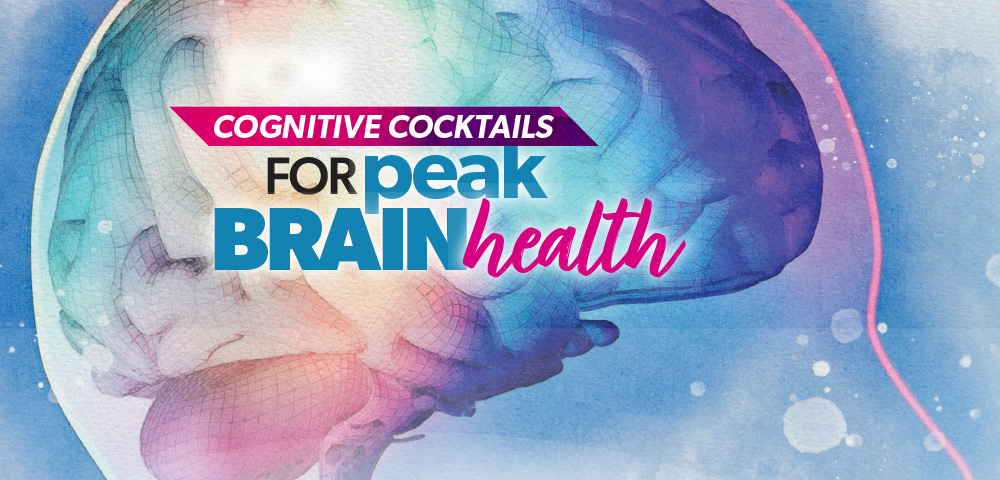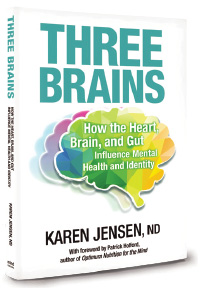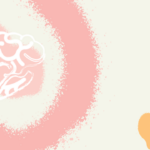
More and more people, both young and old, are diagnosed with brain disorders, including anxiety, depression, insomnia, learning disorders, and memory problems.
Learning about some causes and risk factors associated with these conditions will give you a greater understanding of what you can do to help prevent and treat these life-limiting disorders.
Studies show that nutritional supplementation helps control symptoms of these mental health disorders. The general population in North America is often deficient in vitamins, minerals, and omega-3 fatty acids, and individuals suffering from mental health disorders are often exceptionally deficient.
It is also important to recognize various factors that interfere with optimal brain function. These brain busters include food allergies, environmental toxins, gut microbe imbalance, gluten sensitivity, stress and inflammation, bad fats, and refined foods. Addressing these factors can be a very potent and effective treatment for many people with mental health disorders without the risk of side effects.
Gut Microbiome and Brain Health
Ongoing research shows that gut bacteria communicate with and influence brain function. An imbalance in the good and bad gut microbes, called dysbiosis, is associated with many brain disorders and symptoms. Some of these include ADHD, autism, mood swings, memory problems, anxiety, and depression.
For optimal brain health, it is essential to take the time to learn the importance of lifestyle essentials, like diet and exercise, and the use of supplements to restore and maintain mental well-being.
Cognitive Supplement Cocktails for Mental Health
No one formula can provide the nutrition required to have a beneficial effect on foundational brain health. A few exceptional supplement companies create kits with packets that contain five or more single ingredients. A kit provides an easy, convenient, all-in-one daily packet. When making a purchase, look for kits that contain brain-supportive nutrition like phosphatidylserine, curcumin, omega-3 fatty acids, grapeseed extract, and probiotics.
Many mental health disorders and chronic diseases list stress as the leading cause. Chronic stress increases cortisol, a stress hormone, which leads to inflammation, an underlying cause of many mental health disorders and chronic diseases. As a result, most people, if not all, would benefit from supporting the adaptive stress system. Look for a stress formula that contains the extracts of ashwagandha, rhodiola, Panax ginseng, and green tea, combined with choline to help regulate stress hormones and calm the nervous system.
Age-Related Memory Problems
Age-related memory problems are not the same thing as dementias. While specific brain changes are inevitable in aging, major memory problems are not one of them and are preventable in most cases.
Look for a supplement with key ingredients such as phosphatidylserine, phosphatidylcholine, omega-3 fatty acids, L-alpha-glycerophosphorylcholine (Alpha-GPC), and green tea extract. These are excellent nutrients for those who are starting to experience memory issues.
Mood Disorders
Studies show that probiotics have proven beneficial for stress, anxiety, and depression. For those who struggle with anxiety or depression, probiotics and omega-3 fatty acids are very important as basic supplement support.
Depression
Accumulating evidence shows that inflammation is a significant factor in developing chronic disease and anxiety, depression, and memory problems. Preventing inflammation is vital.
Bacopa, ashwagandha, curcumin, chamomile, and boswellia are all wonderful herbs to prevent and treat inflammation.
Other nutrients for promoting healthy mood balance include inositol, saffron, 5-HTP, and vitamin B6.
Anxiety Disorders
Some people might benefit from extra supplement support to calm the nervous system during anxious periods. Gamma-aminobutyric acid (GABA) and L-theanine are both safe and effective in stress-related anxiety.
Eating for the Optimal Brain
The building blocks and fuel for optimal brain health start with daily exercise, a diet rich in whole foods, and dietary supplements. Carbohydrates are for energy; proteins for the synthesis of the chemical messengers, the neurotransmitters in the brains; antioxidants for preventing free radical damage and inflammation; and good fats for building and protecting neurons.
The Mediterranean diet is an excellent guide to maintaining healthy brain function, along with drinking at least 1.5 liters of water a day. The brain is 73% water, and a shriveled dehydrated brain does not perform well.
Exercise for Peak Brain Function
New studies provide even more evidence that regular aerobic exercise not only prevents issues with memory, but can help turn back the clock on aging. Daily activity also decreases inflammation and increases healthy gut bacteria – both factors that positively benefit brain health. Try incorporating moderate exercise like walking, aerobics, or swimming into your schedule 3–4 times a week for 20–30 minutes.
 For more in-depth information on natural approaches to optimal brain health and mental health disorders, please refer to my book, Three Brains: How the Heart, Brain, and Gut Influence Mental Health and Identity.
For more in-depth information on natural approaches to optimal brain health and mental health disorders, please refer to my book, Three Brains: How the Heart, Brain, and Gut Influence Mental Health and Identity.












